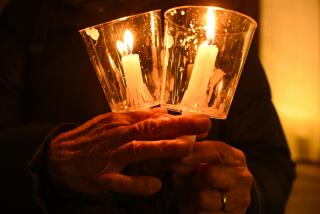Grandchildren, Children of Nazis Embrace Role Reversal
- Share via
STRAUSBERG, Germany — In a country that has embraced pacifism in the half-century since Adolf Hitler’s war machine ravaged Europe, a surprising majority supports the first firing of German weapons in anger since World War II: the bombing of Yugoslavia.
From the corridors of power in Bonn and Berlin to the farms and factories of the depressed eastern states, the descendants of the Nazis see their armed forces’ action to protect Kosovo Albanians as repaying a debt to the guardians of human rights who once acted to halt German war crimes.
“Especially as Germans, our response must be clear: We must never again allow murder, expulsions and deportations to be tolerated,” Chancellor Gerhard Schroeder, an erstwhile antiwar demonstrator and the first German leader with no personal recollection of the last war, insisted in boldly defending his Kosovo policy this week.
“We have a responsibility toward our allies in NATO,” Schroeder said. “We also have a responsibility toward the people of Kosovo, who have become victims of the most gruesome human rights violations.”
Despite decades of indoctrination against German involvement in conflict for fear of resurgent militarism, the public has been steadfastly behind the engagement of Tornado warplanes in the nightly raids against Yugoslavia. In its weekly polls since March 24, the Berlin-based Forsa institute has tracked growing support for German participation--from 57% at the start of the airstrikes to 63% this week.
Because of its bellicose history and responsibility for the horrors of the Holocaust, Germany was prohibited by its 1949 Constitution from military action outside the borders of the North Atlantic Treaty Organization. However, revision of the founding principles after the reunification of Germany in 1990 and the experience of atrocities committed by Serbs in Bosnia-Herzegovina have brought about an evolution in foreign policy.
“After Bosnia and reunification, the Germans must find a new role for themselves, especially as the Americans expect Germany to behave as a normal country with equal rights but also equal duties,” said Frank Umbach, a researcher with the German Society for Foreign Policy.
Germany’s newfound willingness to act as a full NATO member in defending human rights and European security is the culmination of Schroeder’s quest since his election 6 1/2 months ago to usher his nation out from under the shadows of the last war and redress the sins of its fathers.
“It would be a shame if Germany were to shirk its responsibility in this instance,” Michael Wolffsohn, a professor of modern history at the University of the Federal Army in Munich, said of the killings and expulsions in Kosovo, a southern province of Serbia, the dominant Yugoslav republic. “Those who want to draw lessons from history should take note of the fact that now the children and grandchildren of the former murderers are trying to prevent genocide.”
Harrowing images of the suffering of Kosovo Albanian refugees have rekindled memories of the abuses meted out by the Nazis and inspired many to take the side of those acting to spare a new generation of victims.
“Germans did enough bad things this century that we should do our part with NATO to stop them happening again,” said Lutz Kuethke, a 39-year-old bricklayer. “It would be best if some political solution could be found, but as it seems it cannot be, we must help our allies in defending human rights.”
For older Germans, the plight of the Kosovo Albanians brings back shameful memories of having stood by while Nazis committed crimes against humanity in the name of all Germans.
“When I see these horrible images on television, of people fleeing, it all comes back to me, how we made others suffer and suffered ourselves. I think what our army is doing is right if it will stop the killing and injustice,” said Ursula, a 75-year-old retired medic in this former East German army garrison town who didn’t want to give her last name and who witnessed the deportation of Jewish neighbors and the Allied bombing that finally halted Nazi aggression.
Germans’ support for the NATO assaults is stronger in the western regions than in the five “new states” of the former East Germany. In the Berlin daily Tageszeitung on Tuesday, sociologist Dietmar Wittich contended that fewer than 40% of eastern Germans are behind the airstrikes, mostly because the NATO action lacks a U.N. mandate.
“Germany should do its share within NATO, but it is wrong to be involved in this particular conflict. Germans inflicted enough agony on the people of Yugoslavia during the last war,” said Claus Bernegger, a 65-year-old retired soldier.
But younger easterners echo Schroeder’s opinion that a stable, united and prosperous new Germany must shoulder its responsibilities within the alliance as well as enjoy its protections.
“We have overcome this era of being considered differently because of our history,” said Klaus Berndt, an unemployed agricultural worker. “Before, it was appropriate to be in the background, and Germany should in no case play a leading role. But we also should not stand by as if we were indifferent.”
Although Germany has a government made up of leftist Social Democrats and pacifist Greens, there has been strong support voiced for the army’s role in the NATO bombardments.
German Defense Minister Rudolf Scharping, a Social Democrat like Schroeder, has won applause even from archrivals in the opposition Christian Democratic Union for vowing to stand together with NATO allies to stop the atrocities in Kosovo.
More to Read
Sign up for Essential California
The most important California stories and recommendations in your inbox every morning.
You may occasionally receive promotional content from the Los Angeles Times.













